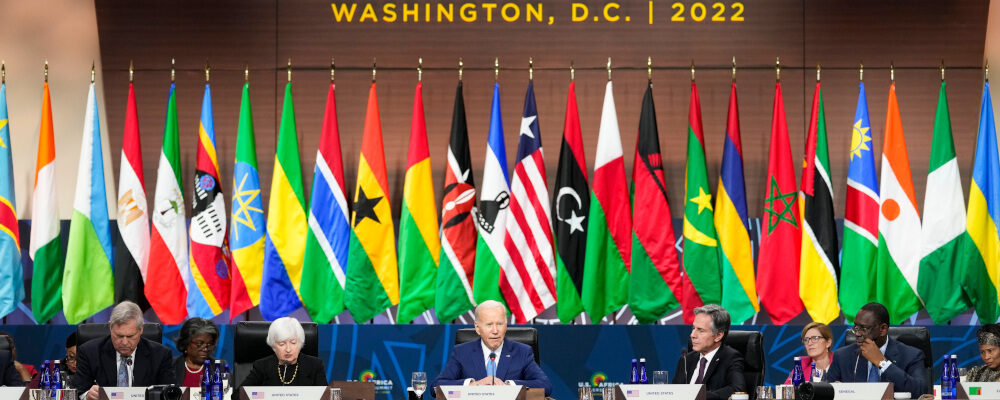It is common to say that the global centre of gravity is shifting to the Indo-Pacific. This region is where most of the world’s people live, where economic power and influence are growing, and where battlelines are being drawn on fundamental political values. In finally trying to have an Indo-Pacific Strategy, Canada’s Liberals are seeking to jump on a train that has long left the station. While acknowledging the factors that make the Indo-Pacific important today, we should also keep an eye on the future. In our view, a big part of that future is in Africa. Recognizing that decisions made on the African continent will likely shape the future of the world more profoundly than those made anywhere else, Canada should develop a coherent policy towards Africa that reflects the realities on the ground there, rather than again missing the train.
One key factor that makes Africa of growing importance is population demographics. Relatively high birth rates in most of the continent mean that the world of the future will have more Africans and that those Africans will shape the course of events. Demographic growth means a young population, a growing workforce, and a cultural impulse to innovate.
In this respect, Africa is relatively unique. By contrast, the residual impacts of China’s one-child policy will lead China to peak and then decline, as it eventually deals with a declining workforce and an aging population. Unlike in the West, the Chinese government’s totalitarian politics and ethno-nationalist rhetoric make population renewal through immigration unlikely. We predict that in the long run, Africa will grow, China will decline, and the West will renew itself through immigration – with many of those immigrants coming from Africa. While today Africa is a field of conflict between China and the West and its nations are navigating the tensions between these two sides, Africans and African nations will soon be calling the tune of global values debates all on their own.
One key example elucidates this point. Nigeria is Africa’s most populous country. It has over 200 million people and its population is expected to double in about the next 30 years. It has a median age under 19 and a birth rate of over five births per woman. This compares to a median age in Canada of over 40 and a median age in Europe approaching 45. Based on these numbers, it is no surprise that the presence and influence of Nigeria and of the Nigerian diaspora are growing.
Africa in general has the potential for dramatically accelerating economic growth because of its human capital, abundant natural resources, and expanding trade. In particular, the recently negotiated African Continental Free Trade Agreement will unlock new wealth and opportunity. Africa’s potential growth and resources have led many to see its potential but also many to see it as a target for exploitation. China’s leaders have seen Africa’s potential for a long time and have been trying to mine it for natural resources while positioning themselves to dominate its political future. China’s leaders are seeking to expand their influence beyond China’s borders, and through that influence redefine international norms to create a world that is “safe” for their political model in the long term.
On the other hand, the West has for too long focussed primarily on Africa’s challenges, especially on poverty, instead of on its potential. There is still a lot of poverty on the continent, but that is far from the whole picture. And even still, expanding mutually beneficial trading relationships between Africa and the West is a critical part of poverty alleviation.
It is true that an honest reckoning of Africa’s potential should include a consideration of its challenges. Poverty is one, and conflict is another. The recent peace deal in Ethiopia and the continuing struggle of the Sudanese people toward democracy are hopeful signs and remind us how African peoples are bravely working out solutions to their own problems. However, in other places conflicts over resources, religious extremism, and crime driven by desperation are growing in the face of limited state capacity to establish order.
The West should seek to be a constructive partner, helping to build state and security capacity. We should especially recognize the ways that Africa’s security affects our own security. Extremist ideologies that are defeated in the Middle East cannot be permitted to find safe haven in parts of Africa, and the increasing presence and influence in Africa of authoritarian powers (including Russia) helps those powers access natural resources and shape decision-making at the UN. Security challenges present another important argument for increased Canadian engagement.

Canada could be ahead of the game by recognizing Africa’s economic potential and security needs and by working to expand its engagement in Africa. As a Western nation without a colonial history in Africa, and as a member of both the Commonwealth and the Francophonie, Canada could have unique advantages on the continent. The tendency of the current government is to prioritize image over results. Going forward we need to leverage our advantages to turn good feelings into concrete impacts, in both politics and commerce.
One of the biggest barriers to increasing people-to-people engagement with African nations is our struggling immigration system. Outrageous backlogs and well-documented racism problems in immigration decision-making are holding back our relationships with countries in Africa. When students from the continent who have been accepted by Canadian post-secondary institutions and official delegations and business leaders seeking short-term visits are frequently denied visas, relationships that could be very fruitful are never built. The visa issues are so bad that they are sowing mistrust and ill will. Our immigration processing failures are hurting our foreign policy.
Canada needs a strong coherent Africa engagement strategy that includes expanded trade and a commitment to promoting people-to-people ties by confronting barriers in the immigration system. This strategy would prepare Canada well for the future. We face a short-term future in which Africa will be the field of conflict between democracy and authoritarianism, and a long-term future in which African nations will themselves be dominant. Canada could have many advantages engaging in this dynamic. We need a government ready to step up and seize the moment.




